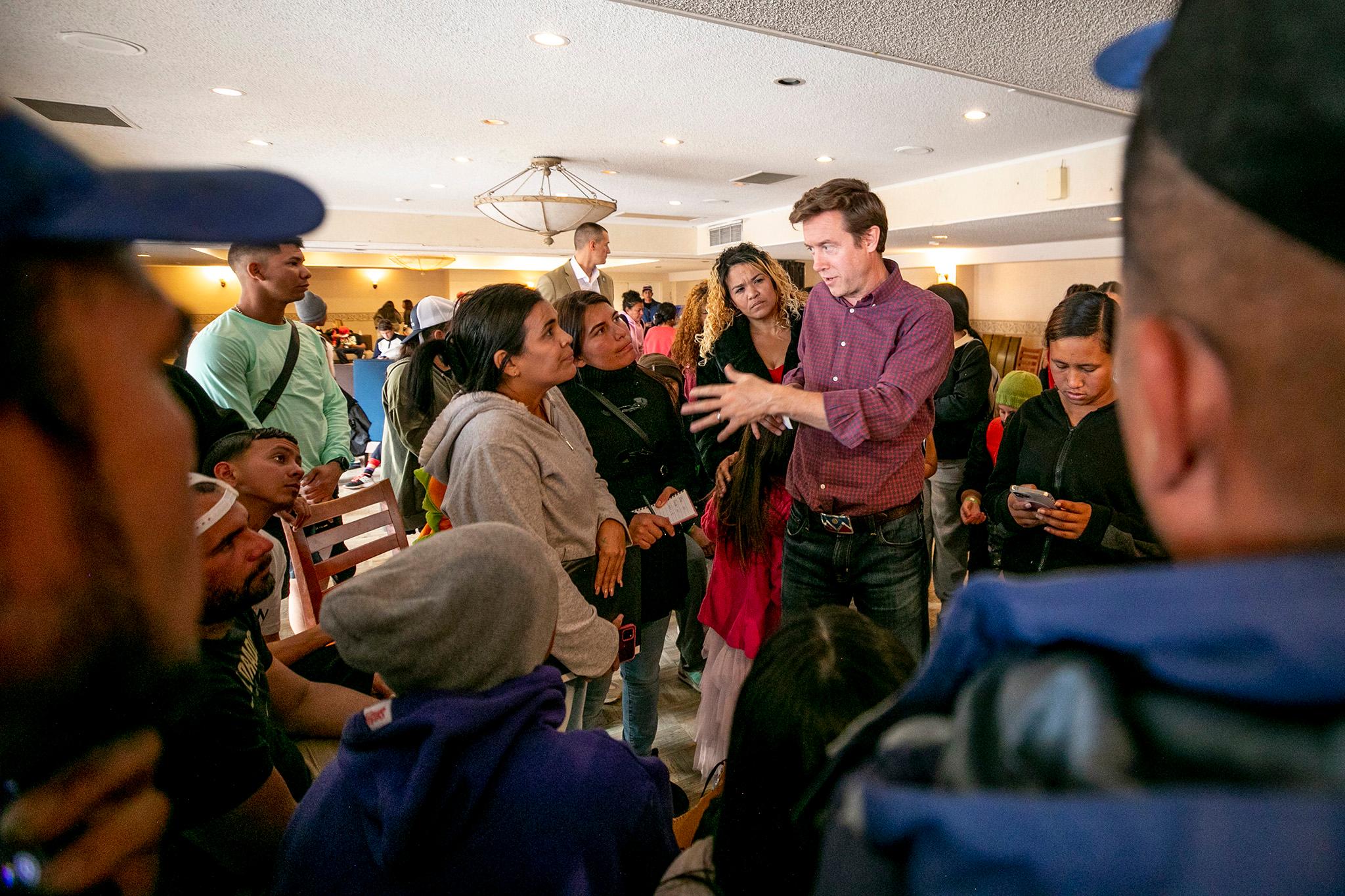Mayor Mike Johnston is asking City Council to cut $45.5 million from the annual budget in 2024 to help pay for his nearly $90 million new immigrant response called the Denver Asylum Seekers Program.
The city is moving away from crisis response and emergency sheltering for new immigrants toward lower-cost efforts to help them become more self-sufficient, get work authorization, move to another city or find a place to live.
Department of Finance Budget and Management Director Stephanie Adams and spokesperson Laura Swartz outlined the proposed cuts, slated to hit City Council committee on April 16, at a press conference on Tuesday, in advance of the mayor’s Wednesday announcement about changes to the city’s immigration response.

At the press conference on Wednesday, Johnston said he won’t enact layoffs, furloughs or pay cuts for city workers.
"They were able to prioritize cuts that would not affect public services," he said.
The mayor will even reverse his unpopular public-facing cuts from earlier this year including reducing recreation center and Department of Motor Vehicle hours.
Rec centers will soon begin hiring and resume standard hours by June 7. Full programming will resume. DMV hours will be restored by August.
"Looking under every cushion for additional funds should have been something he did before he cut positions in the Parks and Rec department and Motor Vehicles," said Lisa Calderón, criminal justice advocate and former mayor candidate . "The stress that his cuts have caused to city workers and the real cost of losing income is something that shouldn’t be taken lightly.
So where will cuts happen?
City agencies have found 160 positions that are hard to fill or new, and those will remain empty.

Vacancy savings will make up 43% of the money Johnston wants to transfer from the general fund.
"If these positions that have been vacant for so long aren't being filled, then there's not a need for them," Calderón said. "Because they're managing without them."
Other money will come from staggered hiring, office supply reductions, travel cuts and deferred tech projects. Departments wanting to pay for studies will largely need to postpone their work. The city found many unused Zoom licenses and other subscriptions and memberships to associations that will be axed.
The city has also looked for other funding sources for things the general fund typically pays for. For example, Denver International Airport will pay for training one class of Denver Police Department recruits.
How much are departments being hit?
Johnston’s office is the only independent city office to cut its budget, leaving the Clerk and Recorder, City Council and the Auditor’s departments’ budgets intact.
Public safety, where the city spends most of its money, will take the biggest dollar hit, and the mayor’s office will take the biggest percentage cut, at 9.5% of its budget.
The Denver Police Department will have to wait for new furniture. The Department of Transportation and Infrastructure will have to delay a freight study.
Most agencies will take roughly 2% cuts.
Former City Councilmember Robin Kniech, who has not had the opportunity to look at the line-by-line breakdown of the budget proposal, said that the cuts may not be visible to the public in the short term — but that doesn't mean they won't affect how the city functions.
"They're making cuts to areas that have a longer term impact to our city's residents and not those that have an impact on them today," she said. "There are consequences if you don't buy furniture or new vehicles today. You are going to be spending more in maintenance. Perhaps you're going to have those vehicles out of service more often."
Sheltering thousands of new immigrants proved unsustainable for Denver
Had the city continued spending like it was in December, when it was sheltering thousands of people in hotels, the cost would have been $180 million in 2024 — more than a tenth of the city’s $1.7 billion budget, according to Johnston.

Starting in early January, he called on departments to look for ways to cut between 10% and 15% of their budgets.
Shortly after, the city started hiring more caseworkers and announced it would begin kicking families out of shelters. The families began to be removed from shelters in early February, many using city-funded bus tickets to go to other states, some moving into homeless shelters, others moving into apartments and many living in encampments that were punted around by city officials.
By February 28, four hotels had closed, saving Denver $60 million. On April 1, Denver shut down two more hotels.
In total, Johnston’s new immigrant response will cost $89.9 million in 2024 alone.
The city has cobbled together just under half of that from rollover money from 2023, FEMA dollars, General Fund contingency dollars and other sources.
There are no other likely federal or state dollars available, said Laura Swartz, a spokesperson for the Department of Finance.
Since December 2022, the city spent $68.1 million on its emergency response, including roughly $35 million since December.
The new budget reflects half of what Johnston predicted the city would need to spend late last year, when the city was sheltering thousands of new immigrants in hotels.
What costs does the nearly $90 million budget cover?
The city will spend $3 million on the administration of the program.
The bulk of expenses, $51.7 million, will cover sheltering and housing people.

Another $9.7 million will be spent on case management, including work authorization and asylum clinics, and $6 million will go to transportation.
The city will also pay $9.5 million toward one-time capital costs and reserve another $10 million for contingencies.
Any unused money will be rolled over for the program into 2025.
This is a developing story and will be updated.











